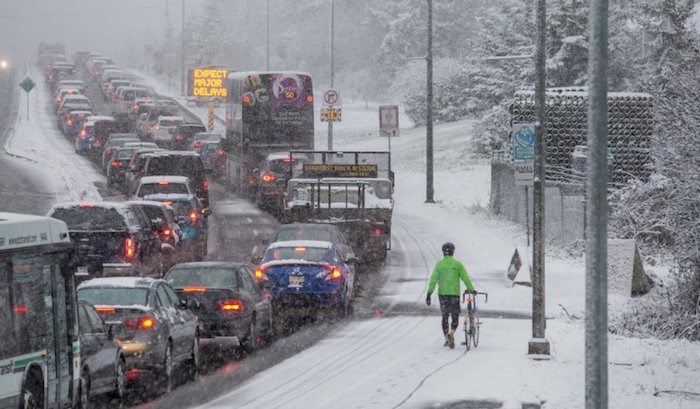Metro Vancouverites are advised to avoid the roads ahead of a potent winter storm.
Environment Canada issued a snowfall warning for the region, with as much as 20 cm of snowfall expected to start falling Tuesday night (Jan 16) and continuing through late Wednesday afternoon.
The snow event is expected to be on the "heavier side" for the region, resulting in treacherous road conditions, meteorologist Derek Lee told V.I.A. on Tuesday.
The B.C. Ministry of Transportation says the inclement weather could pose a hazard to travel and outdoor activities and people should stay home if possible.
While maintenance contractors will apply brine and abrasives to roads and clear them as snow accumulates, potential freezing rain could make commutes more dangerous.
With the risk of freezing rain, people should "avoid travel by vehicle" on Tuesday night through Wednesday morning’s commute.
For safety reasons, the province may close bridges and roads, as "freezing rain is one of the most difficult weather conditions to effectively manage."
What to consider if you must drive in the snowy Metro Vancouver weather
Drivers should check road conditions on DriveBC before heading out, carry an emergency kit that includes a blanket and warm clothes, and allow extra time to get to their destinations.
The City of Vancouver has some examples of emergency kits you can assemble to keep in your home for emergencies. Similar ones can be kept in your vehicle. They should contain food, water, clothing, medicine, money, and any other supplies that you would require if you found yourself stuck on a highway during poor weather.
Here is a list of life-saving supplies you should have in the event of an emergency:
- Compass
- Road maps
- Fire extinguisher
- First-aid kit
- Seat belt cutter
- Emergency food pack
- Flashlight and batteries
- Matches and a survival candle in a deep can (to warm hands and drinks)
- Survival blanket
- Extra clothing or footwear
- Ice scraper and brush
- Methyl hydrate (to de-ice fuel lines and windshields)
- Sand, salt, or cat litter (to help with traction in icy conditions)
- Shovel
- Traction mats
- Tow chain
- Booster cables
- Warning light or road flares
- Axe or hatchet
- Cloth or paper towels



